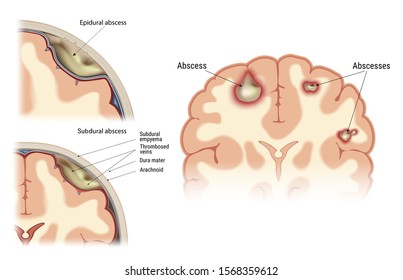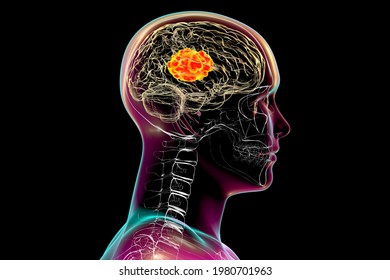
Image Source
Brain abscess is a serious condition that occurs when a pocket of pus or infected material forms in the brain. It is an infection of the brain caused by bacteria, fungi, or other microorganisms that can lead to a variety of neurological symptoms, including confusion, dizziness, headache, nausea, and seizures. Without proper diagnosis and treatment, a brain abscess can lead to long-term neurological deficits, coma, or even death. In this article, we’ll discuss the causes, symptoms, treatment and prevention of brain abscess. We’ll review the risk factors, diagnostic tests, and treatment options for this condition, including antibiotics, surgery, and other therapies. Finally, we’ll explore strategies for preventing brain abscess, such as vaccination and good hygiene. With this information, you’ll be better equipped to recognize the signs of a brain abscess and take action to protect yourself and your loved ones.
What is a brain abscess?
A brain abscess is an infection caused by bacteria, fungi, or other microorganisms that leads to the formation of a localized pocket of pus inside the brain. The bacteria that cause these infections are often present in the human body. Once inside the brain, they usually spread to adjacent brain tissue, creating a pocket of pus known as an abscess. Brain abscesses are relatively rare, with an estimated incidence of less than 1 in every 100,000 people per year globally. Brain abscesses are more common in people who have poor hygiene and frequent cuts and abrasions on their skin (such as medical professionals and those who work in construction or landscaping), or who receive regular medical care with a long-term indwelling device (such as a central venous catheter or a feeding tube). However, anyone can develop a brain abscess, and this condition affects people of all ages. Brain abscesses can occur at any age, although they are most common in children and the elderly.
Reference Source
Causes of a brain abscess
There are a number of causes of a brain abscess. The most common cause is bacterial infection, though a fungal or viral infection can also lead to a brain abscess. Other causes include an infection after trauma to the head, a bacterial infection spreading from another organ in the body, or a rare autoimmune reaction in which the body mistakes its own tissue for a pathogen and attacks it. Specific causes of a brain abscess include the following: - Bacterial infection: Bacteria are the most common cause of a brain abscess. These bacteria may come from a cut or other type of skin infection, such as cellulitis. The bacteria can then travel up the bloodstream and infect the tissues within the brain. - Fungal infection: A fungal infection can lead to a brain abscess. This type of infection occurs most often after a stroke, when the blood flow to part of the brain is reduced or stopped. - Viral infection: Several viruses can cause brain abscesses, including Epstein-Barr virus (which causes mononucleosis), cytomegalovirus, and herpes simplex virus (HSV). - Trauma: An infection that begins after a head injury can lead to a brain abscess. - Secondary bacterial infection: A brain abscess can occur if bacteria from another part of the body (such as the lung, heart, or kidney) spread to the brain. - Secondary fungal infection: A brain abscess can occur if a fungal infection from another part of the body (such as the lung) spreads to the brain. - Secondary viral infection: A brain abscess can occur if a viral infection from another part of the body (such as the lung) spreads to the brain.
Reference Source
Symptoms of a brain abscess
The symptoms of a brain abscess depend on the location and size of the abscess. Brain abscesses are often diagnosed as a result of an imaging procedure such as a CT scan or MRI. Brain abscesses are characterized by a painful, growing lesion in the brain that may cause the following symptoms:
- Fever and chills
- Headache
- Nausea and vomiting
- Confusion
- Dizziness and altered mental status
- Seizures
- Personality changes
- Sudden weakness or paralysis of one or more limbs
- Impaired vision
- Decreased vision in one or both eyes
- Severe and constant pain
- Swollen and tender lymph nodes in the neck and armpits
- Difficulty walking and controlling limbs Brain abscesses are a medical emergency, and a doctor should be consulted immediately after symptoms appear. Brain abscesses are treated with a combination of antibiotics and surgery.
Diagnostic tests for a brain abscess
There are no specific diagnostic tests for a brain abscess. Instead, healthcare providers will conduct a physical exam and run a blood test to rule out other conditions that may cause similar symptoms. They may also order imaging tests such as CT scans or MRIs to locate an infection in the brain.
Treatment for a brain abscess
The first step in treating a brain abscess is to identify and treat the cause of the infection. Antibiotics are commonly prescribed to treat a brain abscess. In some cases, fluid may be removed from the cavity, followed by incision and drainage of the abscess, or surgical removal of the abscess. An individual may need to be admitted to the hospital, possibly in the intensive care unit (ICU). People who have undergone surgery will receive antibiotics intravenously (through a vein) to prevent recurrence. If a brain abscess is caused by an infection from another part of the body, antibiotics may be prescribed to treat that infection as well. The prognosis for people with a brain abscess varies depending on the location and size of the abscess as well as the presence of other health conditions. Brain abscesses are often fatal if not promptly and adequately treated.
Complications of a brain abscess
As with any infection, a brain abscess can lead to complications, such as meningitis, encephalitis, and brain damage. The risk of bacterial meningitis is high in people who have a brain abscess, particularly if the abscess is not treated promptly and properly. Brain damage can occur as a result of untreated or inadequately treated brain abscesses. Once a brain abscess has formed, it often cannot be cured.
Strategies for preventing a brain abscess
There are several steps you can take to prevent a brain abscess. You can reduce your risk of injury, which may decrease your likelihood of developing a brain abscess. You can also protect yourself from illness by getting vaccinated against diseases such as influenza, which can cause a brain abscess. Similarly, you can maintain good hygiene practices to minimize your risk of infection, which can help prevent a brain abscess. You can wash your hands with soap and water or use an alcohol-based hand sanitizer to prevent the spread of bacteria and other pathogens. You can also avoid touching your face, particularly if you have cuts or abrasions on your hands.
Vaccinations to protect against brain abscess
There are no vaccines available to protect against a brain abscess. However, there are vaccines available to protect against bacterial infections that can lead to a brain abscess, including meningitis and pneumonia. These vaccines are recommended for people at high risk of infection, such as children, college students, individuals in health care professions, and people who have weakened immune systems. Additionally, the pneumococcal vaccine can protect against bacterial infections associated with brain abscess. The shingles vaccine also protects against herpes zoster (HZ), which can cause a brain abscess. Finally, the tetanus-diphtheria vaccine is recommended for people who have not received a tetanus booster in the past 10 years, regardless of their risk factors. Good hygiene practices can also help prevent bacterial infections that can lead to a brain abscess. These practices include washing your hands frequently, keeping your hands clean and dry, avoiding touching your face, and covering any cuts or abrasions on your hands.
Reference:
https://www.healthline.com/health/brain-abscess
https://en.m.wikipedia.org/wiki/Brain_abscess
https://www.medicalnewstoday.com/articles/185619#Causeshttps://www.medicalnewstoday.com/articles/185619#Causes

Thanks for your contribution to the STEMsocial community. Feel free to join us on discord to get to know the rest of us!
Please consider delegating to the @stemsocial account (85% of the curation rewards are returned).
Thanks for including @stemsocial as a beneficiary, which gives you stronger support.